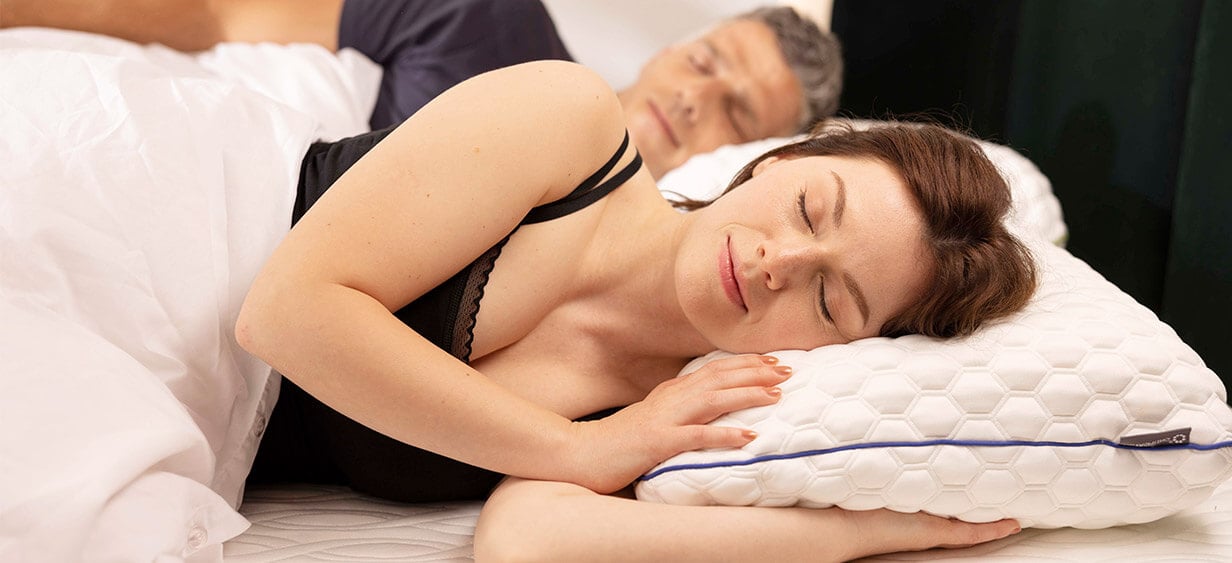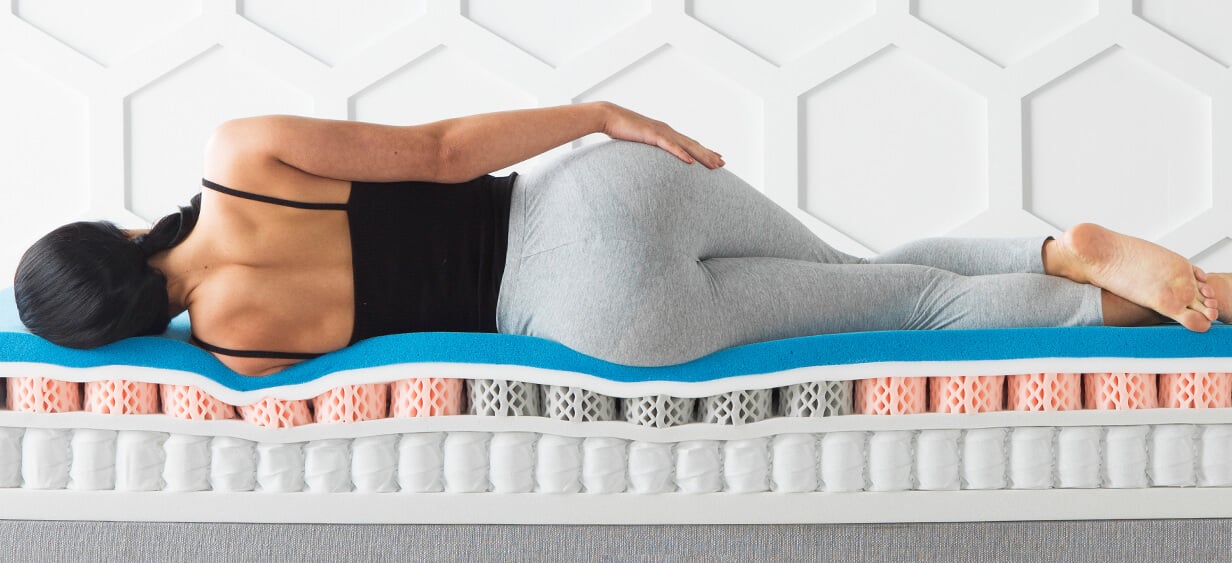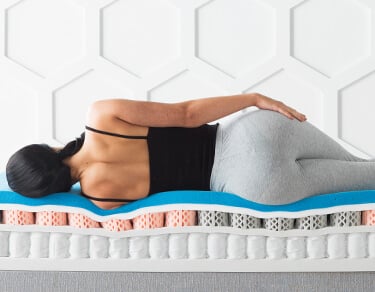What's the Best Mattress for a Bad Back?
If you’re one of the 80% of people in the UK suffering from back pain, it’s important to find the best mattress for you. One that relieves and even alleviates your symptoms. That’s why we’ve put our expertise into this handy guide to finding the right mattress for back pain.
Your back is important. And it factors into almost every aspect of your movement, affecting your posture, your gait, and even the alignment of your neck and shoulders.
Finding the right mattress can relieve and even alleviate the symptoms of back pain, allowing you to wake up feeling refreshed and ready to tackle the day. However, the internet is teeming with conflicting information on finding the best mattress for back pain, making it difficult to know who to trust.
So, with that in mind, we’ve put our knowledge to use and produced the ultimate guide to finding the right mattress for chronic back pain.
We’ll be discussing different types of back pain and their causes and identifying which type of mattress will best support you with any symptoms you may be experiencing. We’ll cover:
- 1. What causes back pain?
- 2. How can a mattress help back pain?
- 3. How does a memory foam mattress help a bad back?
- 4. How does the firmness of a mattress affect back pain?
- 4a. Soft vs Firm Mattresses for Back Pain: Pros and Cons
- 5. Can a memory foam mattress topper help to improve back pain?
- 6. What's the best pillow for back pain?
- 7. How do I know whether a mattress is right for me?
1. What causes back pain?
As people’s lifestyles differ, it can be difficult to identify the exact cause of back pain. Moreover, there’s often no clear reason or underlying condition to blame; an issue the NHS refers to as ‘non-specific’ back pain.
Whether it’s a dull ache in your lower back, or a stiffness in your spine that’s exacerbated by long periods sitting or standing in certain positions, non-specific back pain can be excruciating.Typically, non-specific back pain is felt in the lower back (often known as lumbago), but it can occur in the middle and upper back, too.
Often, non-specific back pain can be traced to environmental factors such as poor posture or undiagnosed injuries, but it can also be triggered by sleeping on a mattress than doesn’t provide appropriate support.
Non-specific back pain can be caused by:
- A temporary injury, like a sprain or pulled muscle.
- Strain, usually caused by heavy lifting or improper lifting technique.
- Sitting or standing in uncomfortable positions, or in a chair without the correct back support.
- Poor posture when standing or sitting.
- Sleeping on a mattress that doesn’t provide the proper support, or interferes with the natural alignment of the spine.
Fortunately, given its lack of underlying cause, non-specific back pain is often temporary and can be alleviated with the right treatment. That said, it’s important to identify the root cause of back pain (as best you can) so you can take steps to prevent it from flaring up later.
Of course, if you’re suffering from back pain, it’s likely that your neck is feeling the pressure, too. If that’s the case, your pillow is probably the culprit, not your mattress. To learn more about the right type of pillows for neck problems, see our section on pillows for back and neck pain.
2. How can a mattress help with back pain?
If you’re eager to alleviate the symptoms of back pain, choosing the right mattress can be a powerful ally.
How? Well, the right mattress will distribute your weight evenly, which, in turn, will support your spine, allowing your muscles to fully relax. The result? A restful, invigorating night’s sleep.
It’s also worth noting the importance of finding the best mattress for chronic back pain, as the wrong mattress can aggravate the problem, potentially leading to further discomfort. For example, a mattress that’s too soft can cause your spine to move out of alignment, leaving you feeling stiff and achy. What’s more, the discomfort may cause you to become restless during the night, greatly affecting your quality of sleep.
3. Is a memory foam mattress good for back pain?
If you’re eager to find the best mattress for a bad back, it’s likely that you’ll consider the wonder that is the memory foam mattress. And for good reason.
Originally developed by NASA, memory foam is made from visco-elastic material and was intended as a multipurpose material for astronauts, based on its unique ability to change shape under heat and pressure.
How does this apply to memory foam mattresses? Well, they mould to the contours of your body, offering you tailored support, wherever you need it.
As such, memory foam mattresses are especially useful for reducing pressure on hips and joints, while keeping the spine in a comfortable alignment.
Our memory foam mattresses are available in a huge choice of sizes, thicknesses and comfort levels, making it easy to find something that suits your needs.
To learn more about the science behind our memory foam mattresses, including how their antibacterial properties can benefit sleepers with allergies, check out our guide to memory foam.
Which is better for back pain: memory foam or sprung mattresses?
Truthfully, this is hugely dependent on both how you sleep, and where you need support the most, so the answer will differ based on your needs.
A traditional coiled mattress provides even weight distribution, which is more comfortable for taller or heavier individuals. Whereas a memory foam mattress shapes itself to the contours of your body, providing targeted support as needed. Because of this, a memory foam option is often considered the best mattress for chronic back pain.
That said, pocket sprung mattresses boast comfort and support benefits for taller and heavier individuals as the individual springs better follow the contours of the body than traditional open coil styles.
It is possible to enjoy the tailored support of a memory foam mattress with the even weight distribution of a classic sprung mattress with our hybrid mattresses. Particularly our Octasmart® Hybrid Plus Mattress and Octasmart® Hybrid Deluxe Mattress, and Octaspring® Hybrid Mattress and Octaspring® Hybrid Plus Mattress. All of which feature both pocket springs and a layer of memory foam for the ultimate comfort.
4. How does the firmness of a mattress affect back pain?
Let’s talk terminology. When we mention mattress firmness, we’re referencing the level of tension in either the springs or foam. And it’s this tension that dictates the level of resistance your mattress provides, and therefore affecting your spinal alignment as you snooze.
Simply put: if your mattress is too hard or too soft it won’t offer the support you need. Worse still, the wrong level of tension for your sleep posture could worsen your back pain.
Typically, doctors and physical therapists suggest a firmer mattress for a bad back, but recent evidence indicates that this may no longer be the case. With a recent study by WedMD finding that people with chronic back pain reported less pain after sleeping on a medium-firm mattress, as opposed to a firm mattress.
In truth, there’s no one-size-fits-all level of tension, as it largely depends on your preferred sleeping position.
If you need help understanding which tension level is best for your natural sleeping posture, take a look at our mattress buying guide. And if you’re looking for the scoop of the differences between soft, medium, and firm mattresses, our mattress firmness guide has you covered.
What’s more, all of our mattresses are given a Comfort Grade rating, so it’s easy to see whether they’re soft, medium, firm or somewhere in-between when you’re shopping.
A note on mattress firmness for chronic back pain
It’s worth noting that if you suffer from chronic back pain, sleeping on the wrong mattress can exacerbate the issue, potentially creating a vicious cycle of pain and sleeplessness.
A mattress that’s too soft will lead to your spine moving out of the correct alignment while you sleep, causing you to wake up feeling sore. As well as potentially affecting your recovery from back pain.
A high-quality mattress that properly supports the spine and allows for good sleeping posture can help to break the cycle, restoring your sleeping pattern and helping you to feel comfortable, both at night and during the day.
4a. Soft vs Firm Mattresses for Back Pain: Pros and Cons
There’s plenty of debate online regarding whether a softer or firmer mattress is better suited to sleepers struggling with back pain, with compelling points on either side of the argument. But which is better? Let’s investigate.
Firm Mattresses
Pros
- Reduced stress on muscles, veins, and arteries
- Improved circulation
- Even weight distribution
Cons
- Takes a little longer to ‘break-in’
- Can aggravate conditions like arthritis and scoliosis
Soft Mattresses
Pros
- Perfectly suited to side sleepers
- Better alignment of hips and spine
- Ideal for lighter individuals
Cons
- Can cause issues for bed couples (based on differences in weight leading to uneven surface)
- More susceptible to general wear and tear
5. Can a padded or memory foam topper help to improve back pain?
If you’re eager to increase the comfort and longevity of your existing mattress without breaking the bank, you might want to invest in mattress topper.
Typically made of memory foam, latex, polyester, or down filling, a mattress topper is an additional later of cushioning that is placed directly on top of your mattress.
Aside from the comfort benefits, mattress toppers can offer support if you’re suffering from regular episodes of back pain, providing an additional later of comfort and support when you need it most.
A memory foam mattress topper is also a fantastic way to experience the benefits of memory foam without investing in a full-size mattress.
When choosing a mattress topper, it’s important to consider your preferred sleeping position, just as you would for a full-size mattress. As a rule, back sleepers should be comfortable on a 3-5cm topper, while side sleepers will need a depth of at least 7cm to accommodate hips and shoulders.
6. What's the best pillow for back and neck pain?
We’ve discussed the best mattress for a bad back, but that’s only part of the equation. While choosing the right mattress is hugely important in addressing back pain, it’s crucial to pair your pick with the right pillow, especially if you suffer from neck pain.
If you frequently wake up with a sore of stiff neck, it’s likely that your current pillow doesn’t offer appropriate support, or worse, nudges your neck out of alignment with your spine.
Proper alignment of the spine is imperative to maintaining optimal neck health and function, so our suggestion is to choose a memory foam pillow, which will mould to fit the shape of your head and neck, relieving (and even preventing) neck pain.
7. How do I know whether a mattress is right for me?
Truthfully, choosing the best mattress for a bad back depends on you. Or rather, the type of support you need.
As such, it’s important to find a mattress suited to your individual sleeping style, allowing it to work its magic while you sleep.
Need a little inspiration? We’ve got you. Check out our guides to the best mattress and pillows for side sleepers, mattresses and pillows for front sleepers, and mattresses for back sleepers as well as pillows to learn which bedding is the right choice for your sleep styling.
At Dormeo, we understand what a big decision choosing the right mattress can be, especially if you suffer from back pain.
And we know that sometimes it takes a few nights to realise that your mattress isn’t right for you. That's why we offer a 60 Night Comfort Guarantee, so you can purchase with peace of mind knowing that if you’re not enjoying your best-ever sleep after 60 nights, or your back pain isn't improving, then you can return your mattress for a full refund or exchange it for an alternative model.
We’re dedicated to ensuring you get the best sleep, so if you're still unsure about anything, contact our team of Sleep Experts who will be happy to help. sleep expert blog and advice centre are also great resources if you’re looking for more information on all things sleep.







